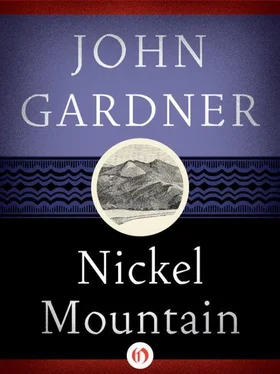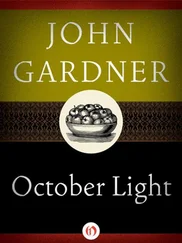With the passing of time he became in reality what he was, his vision not something apart from the world but the world itself transmuted. He’d hired Billy Hartman by this time, so he could rest himself more, at Doc Cathey’s insistence, and he never served customers himself now except on special occasions — a birthday, say, or a wedding. His new detachment encouraged the mystical drift of his thoughts. He would sit with Jimmy eating supper and watching Callie at the cash register, everything around her a-glitter — the glass on the counter, the green and silver mint wrappers, the cellophane on the twenty-five-cent cigars, the glossy knotty pine wall behind her, with the picture of the pheasant on it — and Callie there in the center of it all like a candle — and he would be so moved, all at once, his eyes would fill. He was proud of her, and had a right to be proud, because she too had been changed. She would have been beautiful in any case, one way or another, Henry knew, but marrying him she had found out possibilities not only in him but in herself as well that she might never have found some other way. She never spoke of loving him but sometimes when they locked up the restaurant together she would hold his hand, or when he sat holding Jimmy, reading to him, she would pat the bald spot on his head. And so like a man half-asleep he thought about marriage, which was the same thing as love or magic or anything else he could think of (he could no more distinguish between what was happening from day to day between Callie and himself and what happened between himself and his son than he could tell the difference, except in degrees, between those and the way the restaurant changed him and he, in turn, the restaurant), and he knew, not in words, that it was true, as Emmet Slocum had said once, that people sometimes killed themselves because of the weather but nevertheless they killed themselves by choice.
So it was that Henry Soames had discovered the holiness of things (his father’s phrase), the idea of magical change. And listening to Callie’s mother talk he began to see, he thought, why people were religious. She seemed to know nothing of holiness, Callie’s mother, no more than the preacher at Salem Baptist seemed to know; but listening to her it came to him that the words she bandied about made a kind of sense. She would sit at the piano, up at her place on a Sunday afternoon, and would sing old hymns in her shrill, hard voice, and Henry would sit over by the window in the corner, staring vaguely at the African violets by the lace curtains on the window seat, patting the knee of the child in his lap, and it would come to him that the whole thing might be true. In whisp’ring grass 1 hear him pass. Maybe he’d been wrong; maybe they’d discovered the same thing he’d discovered, and differed from him only in trying to talk about it: a vision of dust succinct with spirit, God inside wasps, oak trees, people, chickens walking in the yard. Maybe like him they had come to feel kindly toward old clothes, farmwomen’s wrinkled elbows, the foolishness of young people, expensive suits, even the endless political talk at the GLF down in Slater. And if he was wrong, he was wrong too to keep himself apart from them: What religion was was a kind of formal acting-out of what every human being felt, vague fears over things he could do nothing about, vague joys over things only partly his doing — the idea of holiness. So one day he had taken Jimmy to the Presbyterian Church in Slater.
It was the church where Henry had gone with his mother as a child. He’d sent Jimmy up to the Sunday School and then had walked around to the front and started in himself to listen to the service. There were people on the steps, not a soul he knew, mostly young or middle-aged, one old, old man — all beautiful as lovers, as it seemed to him, in their Sunday clothes, and all happy-looking, laughing, talking — so happy he thought they must really know what he’d guessed they knew, or not knew, felt: And he had felt humble, ashamed of his monstrous bulk and remoteness, and had crossed the street to look at the washing machines in the Salway Store window until they’d gone in. Then, steeling himself, he crossed again quickly. When he went from the sunlit street to the foyer it was so dark at first he could barely see, but even so he noticed at once a frail, coy-looking elderly woman in a dark blue dress, white hat, white gloves, and he knew by instinct that the woman was there to greet him. His heart leaped, and he snapped his fingers as if he’d just remembered something and turned on his heel and fled back into the light.
For maybe fifteen minutes he walked up and down on the sidewalk, sometimes looking at the maple trees on the church lawn, the gray stone walls, the arched windows, sometimes studying the washing machines, his blood all the while in such agitation he was afraid he might have an attack. When he got up his courage to try it again the woman was gone and the foyer was empty except for the ushers. He could hear the minister praying inside. The ushers left him to himself, and he went to the table where pamphlets were laid out. He picked up the first one that caught his eye, Predestination? in bright red on yellow, and carried it over to the door to leaf through it. It upset him. According to the pamphlet all Christians believed in Predestination, works were of no account whatever (What is human righteousness beside the perfect righteousness of God? it said), and the whole secret was to renounce the arrogant wish for free will and joyfully accept God’s Plan. When he finished reading his hands were shaking. It wasn’t so much that he disagreed; he couldn’t tell whether he agreed or not. He minded the fact that they’d spelled it out: It was not what he wanted, what he wanted was — God knew. “Idealists,” his father would have said: ministers, or the New York State troopers, or Welshmen who ran their families like the army. And then a new thought had come to him. Surely there weren’t ten people in there who knew Predestination from a turnip. They accepted whatever the minister said, and forgot about it, and carried away a vague feeling that it was better to be good than bad, unselfish than selfish, if a man could keep his mind on it, and that somehow things made sense — like the hymn they were singing now, “Faith of our Fathers,” whatever that was, not that it mattered, finally, in the least. And he felt unworthy to go where they were worshipping, and he left again to go stand humbly by the washing machines, waiting for Jimmy.
That afternoon he’d gone hunting again, his fat hands loving on the shotgun, and had shot three squirrels that seemed to him to dance like fire on the limbs. He became what he was, with a gun in his hands: doom and doomed and serene.
They reached the bottom of the slope and rested awhile. Henry took one of his pills, and Jimmy held the gun for him, making a show of holding it very carefully, the way Henry had taught him, the barrel aimed away and toward the ground. The earth was softer here and the grass less brittle, thick and rich yellow-green, shaded by beeches. There was a horse’s skull here somewhere, but he couldn’t think where. Hunting through the grass with his foot, he found a pair of ladies’ underpants, and he covered them up again quickly, embarrassed. They started up the hill. Above them, among the tombstones, the old man and the old woman stood solemn and silent, watching them come near.
They were digging up the body of their son. He’d died at fourteen, fifty years ago, and at that time they’d lived around these parts. Now they lived in Rochester, and since they were getting on in years, coming to the time when they had to take some thought about their final rest, they’d decided to move him to where they were going, a plot in a very nice cemetery on a hillside overlooking the Genesee. The woman was ninety-two, the man eighty-seven; their clothes hung on them like clothes on hangers. Inside his hat, and hanging down over his ears, the man had burdock leaves, and under the burdock leaves thick white hair. He had a brown, unadorned cane with a rubber tip. His skin was white as paper, with splotches on it, and he had white-blue eyes that bulged in his head like the eyes of a skittish horse. He made you think of a preacher, one of the old-timers, not the kind that cowered when he came to your door. The woman looked like a small, addled witch — sharp features, tiny black eyes that glinted like needles, a hundred thousand dirty-looking wrinkles from her collarbone to her hairline. She looked as if she had no water left in all her body, but the rims of her eyes were red. Jimmy clung with one hand to Henry’s belt and watched them.
Читать дальше











